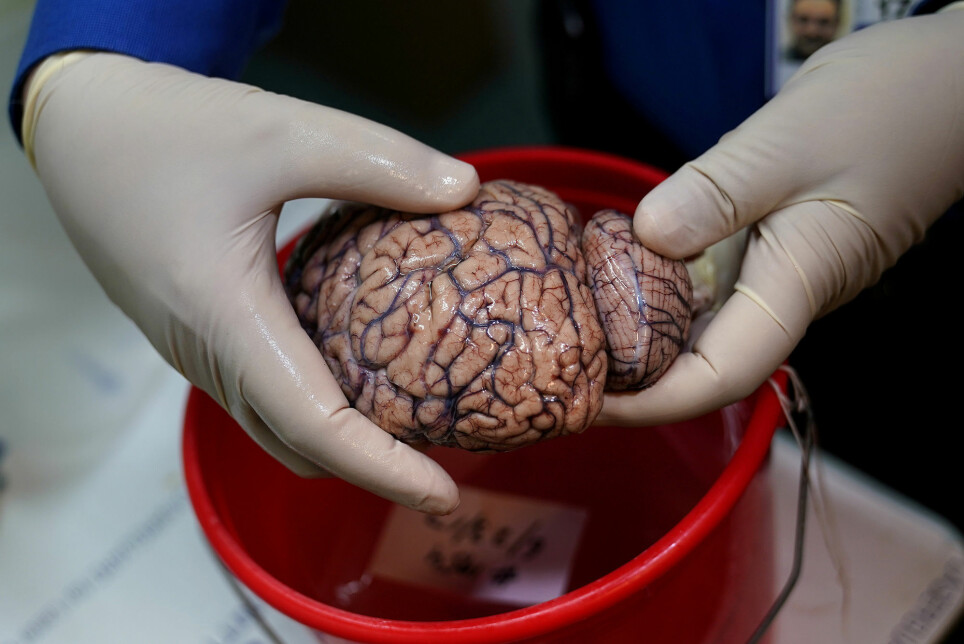Share your science:

The French man who forgot about fruit shows us how the language we speak is pre-coded in our brains
SHARE YOUR SCIENCE: A dog is not an apple. And this is perhaps why one man after a stroke no longer knew what an apple was.
About 20 years ago, a French-speaking man, having suffered a stroke on the left side of the brain, could no longer understand the meaning of words for fruits and vegetables.
When the doctors tested his abilities to name, describe and match items in pictures with words, he had no trouble with animals, no trouble with man-made artifacts. But he struggled to name an apple. He also could not recall the apple’s taste, cuisine, or natural environment. It was obvious that the problem went beyond just remembering what the fruit was called.
So how could this happen? How could a specific group of words, describing a specific type of thing, in this case fruits and vegetables, just disappear from his brain?
Our team of neurolinguists and neuropsychologists from the University of Oslo and the University of New York searched through international databases and found a total of 121 cases similar to the French man who forgot about fruit. Neurological problems that resulted in the loss of entire categories of words. We found the loss of thirty different language categories, to be precise.
Coincidence? We don’t think so.
Challenges the view of “brain as body, language as culture”
A brain is a physical part of a body that evolved through thousands and even millions of years in our predecessors.
The earliest hominines, that is, early humans and our ancient relatives, might not have had language in the form we know now. But it is an intriguing thought that their struggle for survival could have made an imprint on the structure of our brains, and that we see remnants of this in modern man.
Language, on the other hand, evolved alongside the brain in the early human species. Considering the great variation in modern-day languages, some linguists have believed that the many different ways of organizing concepts in languages first and foremost result from cultural differences and local practices. A particular branch of linguistics that we know as the Sapir-Whorf hypothesis even claims that grammatical categories in a given language systematically influence towards greater differences in how speakers of various languages understand the world. We humans become more and more different, not more alike, and the differences in our languages strengthen these differences.
Our findings firmly challenge this idea. The brain’s organization and the concepts we use in the languages of today, it appears, are more closely connected than previously thought.
We found that the same type of concepts that could be lost in neurological patients were also found as grammatical categories in so-called classifier languages, which are found all over the world. To understand why classifiers are used in just about every continent on the planet, let us take a look at their usefulness.

Vegetable-carrots
If you try to learn a foreign language spoken in Asia or Africa, for example Chinese, Vietnamese or Swahili, you will meet the challenge of learning numeral classifiers or noun classes. Whenever you learn a new noun, you will have to think about what meaning category it falls into before you can use the word in a sentence.
Say if you point to a bunch of carrots at the market and say, “Hey, I’d like to buy five ... ”.
Without the correct grammatical knowledge you are lost in communication. Native speakers of classifier languages do this without blinking; they do not even have to think about which classifier category is the right one before they speak:
“I’d like five VEGETABLE-carrots!”
To us, these extra classifier words seem just cumbersome. So what are they good for?
Should we eat it? Is it drinkable?
Classifiers organize the world we live in into categories of meaning that help us interact with the things around us. Should we eat it? Is it drinkable? If we touch it, is it soft or hard? Can we make something useful out of it (say, if it is a cloth or a piece of wood)? Is it a human or an animal?
Some classifier languages slice the cake into even smaller bits to make the world more manageable: If it is a human, is it a man or a woman; is it a person that craves our respect like an elder or superordinate, or a child who might need our care or has a lower status? If an animal, is it one we can eat or is it an inedible one? In this way, grammar directs people’s thoughts towards how they should behave in everyday life.
Although there apparently are a set number of categories that recur in all continents –Africa, Asia, North and South America and Oceania – some finer divisions are obviously motivated by culture. Many East Asian languages for instance, have human classifiers but also divisions along complex kinship systems. Maybe that is why there are more types of categories of such concepts in language than what we find in the brain-damaged patients. Our brains might not be hardwired for very specific, culturally determined concepts.
Documented cases since the 80s
Independently of linguistic studies on these classifier languages, a novel field of study arose in the 1980s. Neuropsychologists have documented several cases of patients showing knowledge impairments in rather specific semantic categories after brain damage and neurological diseases.
At present, slightly more than a hundred cases have been documented that suffered selective loss within their semantic repertoire. Several causes can lead to these symptoms, for example infective diseases to the brain, head injury, stroke, and neurodegenerative illnesses like Alzheimer's disease and semantic dementia. Typically, they could not identify or express knowledge about categories such as animals, plants, food, tools, body parts and fruit and vegetables.
Astonishingly, these were the same type of concepts that had turned up in the classifier languages!
Remarkably, the researchers of these two fields, linguistics and neuropsychology, were totally unaware of each other’s work. Until now.
The apparent overlap of semantic categories in the two independent research fields inspired us to make the prediction that whatever concept categories patients suffer from would also appear in the classifier languages. In fact, this was the case, only in the languages there were a few more.

French does not have a fruit-category
As we saw above, the French patient lost knowledge about fruits and vegetables, while his knowledge about animals and man-made things remained intact.
In studies on language and thought, it is rare that one can study one without the other, but here we could.
French is not a classifier language, and so it does not include in its grammatical repertoire a ‘fruit and vegetable class’. This rules out the possibility that the language spoken by the patient had anything to do with his loss of understanding the fruit and vegetable category.
That is, he did not lose a category that he first learned through his language. And yet this category apparently still existed in his brain, since it could be selectively lost.
This brings us to the beautiful design of our study.
Our team did not use geography as a criterion when searching the databases, yet the classifier languages, as a stroke of luck, turned out to be spoken on all continents except Europe. And because medical records were made in hospitals in Western countries in Europe and the United States, the patients happened to speak European languages, which do not have classifiers: English, German, French, and so on. In other words, we could study losses of categories in people that had not established these categories in their brains through their native grammars.
Instead, this correspondence constitutes a convincing case for an underlying commonality in cognition – mental processes that allow us to gain knowledge – for humans in general, through two different looking glasses.
What we found reveals a parallel across linguistics and neuropsychology; two completely separate fields of enquiry.
Insights for the future
Two questions remain. Why did it become like this, and how can we benefit from these new insights?
To start with, we suggested that human cognitive structure may be common across languages and patient populations because we, as humans, share an evolutionary history. Humans have gone through the same developmental processes and experiences in an unchanging physical world, which jointly shaped the human mind to be prepared for specific but recurrent domains of knowledge.
Not only in our distant past, but even today it is essential that we can tell a living being from a lifeless object, and know the usefulness of a tool and what substances are edible.
Semantic losses can be fatal! In 1988, a woman contracted Herpes Simplex Encephalitis, a very common and contagious disease, at the age of nineteen. A CAT-scan showed a swelling in the left temporal region of her brain. Vision and hearing were normal and there was no sign that her ability to recognize objects in general was damaged. However, she lost her knowledge about food. She could not recognize food items by taste or texture and was observed eating and drinking inedible things, including talcum powder, hair and baby oil! Without such basic knowledge we cannot survive for long.
Then to our next question: how can our recently gained insights be used?
The testing procedures of these patients, although thorough from a medical point of view, were still quite random and unsystematic, and the range of categories that have been tested is limited (remember, there were more categories in the classifiers than in impairments). Perhaps the patients have more problems that did not surface because of inadequate testing procedures? We hope that our new insights will help neuropsychologists select from the list of classifier language categories so that these patients may be more satisfactorily diagnosed.
Not all categories may have arisen in our distant past; there are ‘modern’ concepts as well, like vehicles and furniture. As our way of life changes, so do our concepts. Our brains are not ‘carved in rock’; they are highly malleable.
Share your science or have an opinion in the Researchers' zone
The ScienceNorway Researchers' zone consists of opinions, blogs and popular science pieces written by researchers and scientists from or based in Norway.
Want to contribute? Send us an email!




























